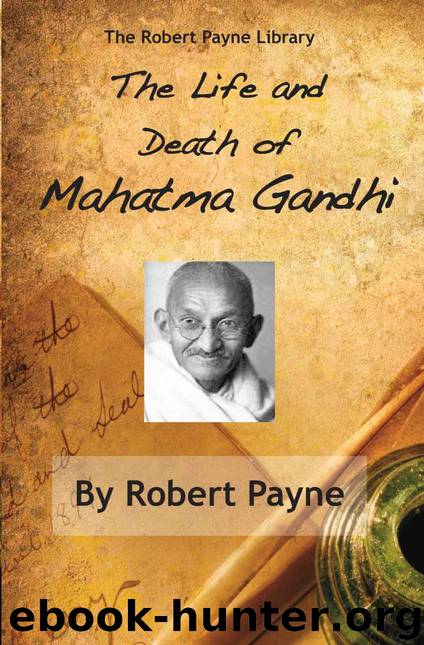The Life and Death of Mahatma Gandhi (The Robert Payne Library) by Robert Payne

Author:Robert Payne
Language: eng
Format: mobi
ISBN: 0831758708
Publisher: Brick Tower Press
Published: 2014-06-05T21:00:00+00:00
The Great Trial
THE TRIAL, which took place on March 18, 1922, was so calm, so orderly, so lacking in contentiousness and anger, that it assumed the character of a quiet confrontation between two men who had known and studied each other for a long time. The judge was mild-mannered and apologetic. Gandhi was quietly content, and would sometimes break out in smiles. An observer at the trial described him as “festively joyful,” but this was to exaggerate his joy. He had serious and even terrible matters to discuss, and he was under no illusions about the severity of the punishment he expected to receive, for he was charged with sedition and no government punishes sedition lightly. He could expect a very long term of imprisonment, and although he sometimes claimed that he regarded prison terms as rest cures, necessary at occasional intervals, providing him with a calm atmosphere for reading and prolonged meditation, he always chafed under imprisonment, found the prison food abhorrent, and the prison regulations nearly intolerable.
The tone of the trial was set by the judge when he took his seat, bowing gravely to his distinguished prisoner. Gandhi returned the bow. The judge said later that he was perfectly aware that he was dealing with a man “of high ideals and of noble and even saintly life,” but it was his duty to administer the law, which was no respecter of saints. He gave the impression of a man who was performing a distasteful task with courtesy and good sense. His task was made all the easier by the fact that Gandhi preferred to have no lawyers to defend him and pleaded guilty to all charges.
In theory the trial which was listed as “Sessions Case No. 45—Impera-tor v. (1) Mr. M. K. Gandhi, (2) Mr. S. C. Banker” was concerned to punish the author of three inflammatory articles which had appeared in Young India at intervals during the previous year. In the first, called “Tampering with Loyalty,” which appeared in September, Gandhi openly declared that his task was to encourage sedition and to accept the consequences. He wrote:
We ask for no quarter; we expect none from the Government. We did not solicit the promise of immunity from prison so long as we remained nonviolent. We may not now complain if we are imprisoned for sedition. Therefore, our self-respect and our pledge requires us to remain calm, unperturbed and non-violent. We have our appointed course to follow.
Gandhi left no doubt what the appointed course was, and in an article called “A Puzzle and its Solution,” which appeared in December, he stated the case for subversion with the utmost simplicity. “We want to overthrow the Government,” he wrote. “We want to compel its submission to the people’s will.” He added that it would be a fight to the finish, and that the Indians had not the slightest intention of submitting to a reign of violence. In the third article, called “Shaking the Manes,” which appeared toward the end of February,
Download
This site does not store any files on its server. We only index and link to content provided by other sites. Please contact the content providers to delete copyright contents if any and email us, we'll remove relevant links or contents immediately.
Fingersmith by Sarah Waters(2536)
Kundalini by Gopi Krishna(2180)
Wheels of Life by Anodea Judith(2146)
Indian Mythology by Devdutt Pattanaik(1937)
The Bhagavad Gita by Bibek Debroy(1929)
The Yoga of Jesus: Understanding the Hidden Teachings of the Gospels by Paramahansa Yogananda(1861)
Autobiography of a Yogi (Complete Edition) by Yogananda Paramahansa(1825)
The Man from the Egg by Sudha Murty(1812)
The Book of Secrets: 112 Meditations to Discover the Mystery Within by Osho(1675)
Chakra Mantra Magick by Kadmon Baal(1638)
The Sparsholt Affair by Alan Hollinghurst(1585)
Sparks of Divinity by B. K. S. Iyengar(1532)
Gandhi by Ramachandra Guha(1528)
Avatar of Night by Tal Brooke(1521)
Karma-Yoga and Bhakti-Yoga by Swami Vivekananda(1492)
The Bhagavad Gita (Classics of Indian Spirituality) by Eknath Easwaran(1487)
The Spiritual Teaching of Ramana Maharshi by Ramana Maharshi(1432)
Hindoo Holiday by J. R. Ackerley(1378)
Hinduism: A Very Short Introduction (Very Short Introductions) by Knott Kim(1374)
